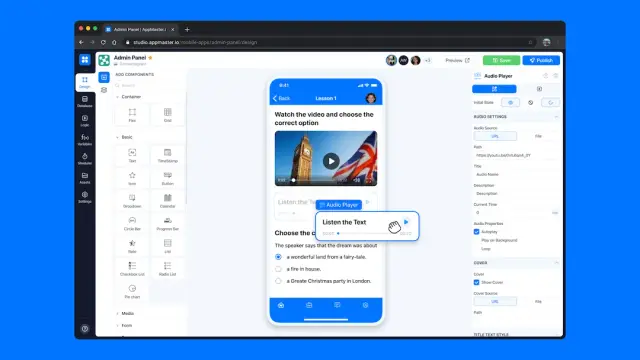The Rise of Citizen Developers: A Digital Revolution
Explore the digital revolution fueled by citizen developers, their role in modern app development, and how no-code and low-code platforms like AppMaster are enabling this transformation

What are Citizen Developers?
Citizen developers are non-technical individuals who create applications or software solutions without any formal programming expertise. They leverage low-code and no-code platforms to design, build, and deploy applications to solve business problems, improve efficiency, and enhance the user experience. The term "citizen developer" reflects the idea of empowering ordinary people, or "citizens," to contribute to the digital transformation of organizations.
By equipping non-technical employees with user-friendly development tools, organizations can harness the creativity and skills of a larger portion of their workforce to drive innovation and business growth. The concept of citizen development has gained traction, primarily due to the growing availability of low-code and no-code platforms that enable individuals with limited or no programming experience to create powerful applications. These platforms have simplified app development, making it more accessible and faster than ever.
The Role of Citizen Developers in Modern App Development
In today's competitive business environment, organizations are constantly seeking ways to speed up application development, improve efficiency, and reduce costs. Here lie the main benefits of citizen developers in modern app development:
Accelerate Innovation
Citizen developers take advantage of no-code and low-code platforms to quickly build and deploy applications, thereby speeding up the process of turning ideas into tangible solutions. This acceleration of innovation helps organizations respond faster to market changes and capitalize on opportunities.
Collaborative Development
Empowering citizen developers creates a more collaborative development environment within an organization. Employees from different departments and backgrounds can contribute to the development process, offering new ideas, insights, and perspectives that can lead to more creative and effective solutions.

Reduce Workload on Traditional Developers
By enabling non-technical users to create applications, the pressure on traditional developers is reduced. This allows professional developers to focus their efforts on more complex projects and other strategic priorities.
Bridge the Skills Gap
The demand for application development skills continues to outpace the supply of available developers. By training and empowering citizen developers within an organization, businesses can bridge this skills gap, ensuring that they have the necessary talent to meet their development needs.
Streamline Business Processes
Citizen developers often have a deep understanding of the business processes, pain points, and requirements within their specific departments. This knowledge enables them to build tailored solutions that can significantly improve operational efficiency, customer service, and compliance.
Low-Code/No-Code Platforms: The Enablers of Citizen Developers
Low-code and no-code platforms have emerged as the primary enablers of citizen developers, providing them with the necessary tools to create applications without extensive programming expertise. These platforms typically offer the following features:
- Visual Interface: Low-code and no-code platforms often employ a visual interface, which allows developers to design app layouts and data models using drag-and-drop functionality. This intuitive approach significantly simplifies the development process and makes it accessible to non-technical users.
- Pre-built Components: To streamline app creation further and eliminate the need for custom coding, low-code and no-code platforms provide pre-built components and templates that developers can easily integrate into their applications. These can include functions such as data authentication, navigation, and API connectivity.
- Business Process Automation: Automation capabilities enable citizen developers to model, automate, and optimize business processes without writing code. By visually designing workflows, developers can integrate logic, manage data, and control various aspects of the application's behavior.
- Responsive Design: Many low-code and no-code platforms support responsive design out-of-the-box, ensuring that applications will automatically adapt to different screen sizes and devices. This eliminates the need for developers to create different versions of the app for web, mobile, and tablet users.
- Integration Support: Integration with external systems and APIs is essential for most enterprise applications. Low-code and no-code platforms often provide pre-built connectors for popular software, APIs, and databases, making it easy for citizen developers to integrate their applications with existing systems.
One such platform that successfully caters to citizen developers is AppMaster.io. AppMaster is a powerful no-code platform that enables users to create backend, web, and mobile applications using visual data models, drag-and-drop functionality, and business process automation. With the help of AppMaster, citizen developers can quickly produce and deploy various applications, ensuring that their organizations stay at the forefront of digital innovation.

Benefits of Citizen Development in Organizations
Citizen development is a powerful catalyst for organizations seeking growth and innovation. When non-technical team members can leverage no-code and low-code platforms to create custom applications, the benefits are substantial. Here are a few ways citizen developers contribute to organizational transformation:
- Faster App Development and Deployment: With low-code and no-code tools, citizen developers can accelerate the development and deployment of applications, reducing the time taken to bring solutions to market.
- Reduced Development Cost: Enabling non-technical personnel to create applications can significantly cut down the dependency on highly skilled developers and programmers, thereby reducing overall development costs.
- Increased Innovation and Agility: Since citizen developers can easily create, iterate, and launch new apps using no-code and low-code platforms, organizations can quickly adapt to market changes and competitors’ actions, fostering a culture of continuous innovation.
- Improved Collaboration: Encouraging non-technical team members to participate in application development results in greater cross-functional collaboration and knowledge sharing. This, in turn, fosters a more cohesive work environment.
- Optimized IT Resources: Citizen developers can help relieve the IT team's workload by handling small-scale applications and enhancements, allowing IT specialists to focus on more complex and critical projects.
- Empowered Business Users: Citizen developers give business users the power to create custom applications tailored to their unique needs and processes, ensuring better efficiency and effectiveness across the organization.
Platforms like AppMaster.io can help citizen developers bring these benefits to their organizations through their no-code development tools, visual interfaces, and pre-built components that simplify and accelerate application development.
Real-life Success Stories of Citizen Developers
Citizen development has gained traction across various industries, empowering non-technical users to create impactful solutions and transform their organizations. Here are some real-life success stories of citizen developers who have achieved significant results:
- Healthcare: A healthcare organization enabled its non-technical staff to create a mobile application for managing patient appointments and follow-ups. This solution drastically reduced the manual workload on its staff and increased overall patient satisfaction.
- Finance: A financial services company needed a better way to process loan applications. Using a low-code platform, a citizen developer within the company created a custom loan approval app that streamlined the application and approval process, resulting in faster loan processing and a better customer experience.
- Education: An educational institution needed to modernize its student and staff management system. A citizen developer within the organization used a no-code platform to build a new management system that automated several manual processes and significantly improved staff efficiency and student engagement.
- Retail: A retail store needed an inventory management system to reduce stock discrepancies and provide real-time stock levels. A citizen developer in the company leveraged a low-code platform to create a custom inventory tracking app, resulting in better supply chain efficiency and reduced stock discrepancies.
- Manufacturing: A manufacturing company had challenges with tracking production progress and identifying bottlenecks. A citizen developer within the organization built a custom production tracking app using a no-code platform, enabling better transparency and faster identification of bottlenecks in their production process.
These success stories highlight the ability of citizen developers to drive digital transformation across industries and empower businesses with tailor-made solutions.
Choosing the Right No-Code and Low-Code Tools
Selecting the right no-code or low-code platform can make all the difference for citizen developers looking to create effective, scalable applications. When evaluating potential tools, keep the following considerations in mind:
- Ease of Use: Look for a platform that has an intuitive and user-friendly interface that makes it easy for non-technical users to create applications without extensive training or learning curves.
- Scalability: Choose a platform that can be easily expanded to accommodate growing user bases, increasingly complex applications, and evolving requirements. This ensures the sustainability of your projects as your organization's needs change over time.
- Platform Capabilities: Evaluate the range of features and functionalities that a platform offers, with a focus on selecting a platform that caters to your specific business requirements.
- Integration Support: Ensure that the platform you choose is capable of integrating with your organization's existing software tools and systems, or future tools that you may want to use. This facilitates seamless data exchange and improves overall efficiency.
- Subscription Pricing: Consider the cost implications of different platforms and weigh the benefits against your budget constraints. Remember that the most expensive option is not always the best one, and the most suitable platform should balance functionality with affordability.
- Customer Support: Finally, select a platform that offers customer support to provide guidance and assistance as you embark on your citizen development journey.
AppMaster.io is an example of a powerful no-code platform that effectively supports citizen developers in creating backend, web, and mobile applications. Its visual interface, drag-and-drop features, and business process automation capabilities enable users to develop applications quickly and efficiently. Additionally, with multiple subscription options, AppMaster is adaptable for various organizational needs and budgets.
In conclusion, the rise of citizen developers marks a significant shift in the digital environment as non-technical users take the reins of app development. No-code and low-code platforms like AppMaster.io stand as enablers of this revolution, empowering individuals and organizations to break through traditional development barriers and create innovative, effective solutions that drive real business impact.
FAQ
A citizen developer is a non-technical individual who creates applications or software solutions without any formal programming expertise, using low-code or no-code platforms.
Citizen developers significantly speed up app development and innovation by allowing non-technical users to create and deploy apps, reducing the workload on traditional developers and promoting collaboration within organizations.
Low-code and no-code platforms are tools that enable individuals without extensive programming skills to create apps and software solutions. These platforms have a visual interface and provide pre-built components to simplify application development.
Citizen development offers several benefits, such as reduced development time, lower costs, increased innovation, improved collaboration, and better business agility.
AppMaster.io is a powerful no-code platform that allows citizen developers to create backend, web, and mobile applications using drag-and-drop functionality, visual data models, and business process automation.
Success stories of citizen developers can be found in various industries, including healthcare, finance, retail, and more. Many organizations have used citizen developers to accelerate app development, streamline operations, and enhance customer experience.
To choose the right low-code or no-code platform, consider factors such as ease of use, scalability, platform capabilities, integration support, subscription pricing, and the quality of customer support.





